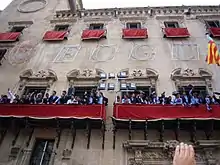Hércules CF
Hércules de Alicante Club de Fútbol, S.A.D. ([ˈeɾkules]) is a Spanish football team in Alicante, in the Valencian Community. Founded on 25 October 1922, it currently plays in Segunda Federación – Group 3, and plays its home games at the 29,500-capacity Estadio José Rico Pérez.[2][3]
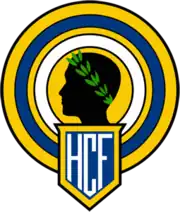 | ||||
| Full name | Hércules de Alicante Club de Fútbol, S.A.D.[1] | |||
|---|---|---|---|---|
| Nickname(s) | Los Herculanos / Els Herculans (The Herculeans) Los Griegos / Els Grecs (The Greeks) Los Blanquiazules / Els Blanc-i-blaus (The White and Blues) | |||
| Founded | 25 October 1922 as Hércules Foot-ball Club | |||
| Ground | José Rico Pérez, Alicante, Valencian Community, Spain | |||
| Capacity | 29,500 | |||
| Owner | Enrique Ortiz | |||
| President | Carlos Parodi García-Pertusa | |||
| Head coach | Rubén Torrecilla | |||
| League | Segunda Federación – Group 3 | |||
| 2022–23 | Segunda Federación – Group 5, 7th of 18 | |||
| Website | Club website | |||
|
| ||||
History
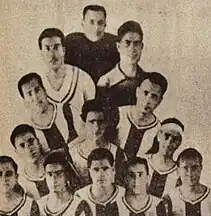
Hércules CF has been documented since 1914 although not officially registered until 26 September 1922, alongside Mercantil de Cartagena, Federación Levantina and others. Its founder was Vicente Pastor Alfosea dubbed "El Chepa".[4] In its early days, the club played in various locations, the foothills of la montañosa, the lands of l'Hort del tio Ron, the campo de Benalúa or the facilities of the Alicante Recreation Club. Hercules joined a youth league, becoming champion in 1918. The first official match was in 1919 against Athletic Club Benaluense, Hercules winning 2–1. At first the team played in white and red striped shirts and black pants.
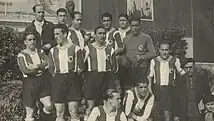
After first appearing in La Liga in the 1935–36 season, Hércules would play sporadically in the category for the next 40 years, playing mainly in the second division but going as low as the third. From 1961 to 1969, neighbours Alicante acted as its feeder club.
.jpg.webp)
After a ten-year spell in the top flight, encompassing 12 seasons in the 1970s and '80s, the club only returned again in the 1996–97 campaign. Though eventually relegated, it managed two remarkable comeback wins over Barcelona, which ultimately handed the Liga title to Real Madrid.
In 2004–05, after five years in the third level, Hércules finished second, being subsequently promoted to the "silver category". After posting three consecutive solid seasons, the club narrowly missed out on a return to the top division in 2009, finishing fourth, three points behind last-promotee Tenerife.
The 2009–10 campaign saw Hércules promoted back into the top flight after 14 years in dramatic fashion: losing 0–1 at half-time at Rayo Vallecano, the team fought back to win 2–1 in the penultimate game of the season and leap frogged Real Betis into third place.[5] In the last round, a 2–0 away win against relegation-threatened Real Unión guaranteed promotion, with the 4–0 win of Betis over Levante eventually counting for nothing (all three teams – Levante, Hércules and Betis – ended equal on points).
Early into the 2010–11 season, one year, three months and 19 days after Barcelona's last home defeat in the league, Hércules recorded a shock 2–0 win at the Camp Nou thanks to a brace from Nelson Valdez[6] – Barcelona had won their last 11 home matches, scored at least three times in each of their last six league fixtures and were protecting a 17-game unbeaten streak. This was the Alicante outfit's third successive win over the Barcelona, having won both meetings in their previous top flight campaign 14 years before.[7]
In the 2013–14 campaign, they were relegated to the Segunda División B after finishing in last place in the Segunda División.
In the 2016–17 Copa del Rey, the team drew 1–1 with Barcelona. In the second match at the Camp Nou (Barcelona's home), Hércules was defeated by the Catalonian side 7–0.
Season to season
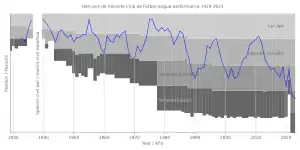
|
|
|
|
|
- 20 seasons in La Liga
- 43 seasons in Segunda División
- 18 seasons in Segunda División B
- 3 seasons in Segunda Federación
- 7 seasons in Tercera División
Players
Current squad
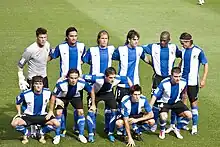
- As of 3 January 2023[8]
Note: Flags indicate national team as defined under FIFA eligibility rules. Players may hold more than one non-FIFA nationality.
|
|
Former coaches
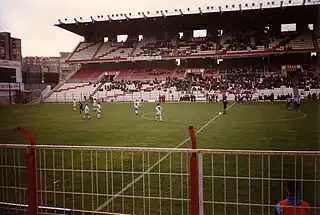
|
|
|
|
Relationships with other teams
 Iraklis – Since 2003, fans of both teams formed a friendship through the Internet, because "Iraklis" is a Greek name for "Hercules", the Roman name for Heracles, the Greek god of strength. There is even a Hércules supporters club that bears the name Iraklis, in honor of their friendship.[9] They also have a newly formed partnership with St Johnstone FC of Scotland.
Iraklis – Since 2003, fans of both teams formed a friendship through the Internet, because "Iraklis" is a Greek name for "Hercules", the Roman name for Heracles, the Greek god of strength. There is even a Hércules supporters club that bears the name Iraklis, in honor of their friendship.[9] They also have a newly formed partnership with St Johnstone FC of Scotland.
See also
References
- "Hércules de AlicanteCF – Datos del club" [Hércules de Alicante CF – Club data] (in Spanish). Hércules CF. Archived from the original on 29 May 2013.
- "Estadio Jose Rico Perez – Alicante – The Stadium Guide". Archived from the original on 31 May 2019. Retrieved 24 January 2020.
- "Estadio José Rico Pérez – AlicanteInfo.net". alicanteinfo.net. Archived from the original on 29 May 2019. Retrieved 24 January 2020.
- Guerra, Víctor (2 March 2014). "Vicente Pastor, El Chepa: alma mater del Hércules C.F." La Millor Terra del Mon (in European Spanish). Archived from the original on 17 July 2020. Retrieved 24 January 2020.
- "El Hércules vuelve a Primera catorce años después". abc (in Spanish). 19 June 2010. Archived from the original on 2 March 2021. Retrieved 24 January 2020.
- "Valdez brace sinks champions". ESPN Soccernet. 11 September 2010. Archived from the original on 23 October 2012. Retrieved 29 September 2010.
- Remarkable runs and a seismic shock; FIFA.com, 15 September 2010
- "Plantilla Hércules de Alicante Club de Fútbol | Hércules – Web Oficial". Plantilla Hércules de Alicante Club de Fútbol | Hércules – Web Oficial (in Spanish). Retrieved 3 January 2023.
- El Hércules proyecta su imagen en otros tres equipos europeos Archived 28 March 2010 at the Wayback Machine. Noticia de 2005 de La Verdad.
External links
- Official website (in Spanish)
- Futbolme team profile (in Spanish)
- BDFutbol team profile
- Macho Hércules, fansite (in Spanish)
- Club & Stadium History at Estadios de España Archived 21 December 2017 at the Wayback Machine (in English)
